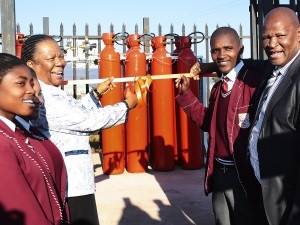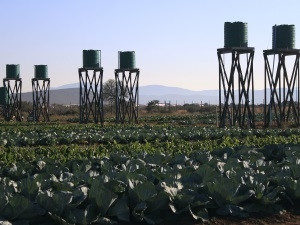
The Department of Science and Technology (DST) on Friday unveiled hydrogen fuel cells successfully providing standby power to three schools in Cofimvaba, Eastern Cape, as part of its Technology for Rural Education Development (TECH4RED) project.
The fuel cells, which have been operating at St Marks Junior Secondary School, Arthur Mfebe Senior Secondary School, and Mvuzo Junior Secondary School since September 2014, were commissioned by Clean Energy Investments, a South African company co-owned by the DST and Anglo-American Platinum (AAP).
AAP sponsored the three platinum-based fuel cell systems, including installation and ongoing maintenance and operations, while Air Products supplies the hydrogen fuel.
Each of the three schools is equipped with a 5KW fuel cell system, which provides standby power for charging learning devices, namely tablets, during power outages, explained Phillip Venn, engineering manager for packaged gases at Air Products SA.
The fuel cells are linked to a remote monitoring system which informs Air Products of when they need to be refilled, said Venn. Each fuel cell is refilled every three to four weeks, he estimated.
"As technology is incorporated into the education environment, power stability at schools is essential," said Gavin Coetzer, CEO at Clean Energy Investments. "Fuel cell standby power solutions are efficient, reliable, safe and quiet, ensuring a non-intrusive standby and - potentially - primary power solution."
As part of the TECH4RED project, the DST will later this year install two solar power systems and a biogas system, as well as provide portable rechargeable batteries to learners in the area with no electricity in their homes.
Sanitation solutions

Along with clean energy solutions, TECH4RED encompasses a variety of other technological developments for improving education, such as sanitation and agricultural technology.
St Marks on Friday showed off a toilet developed by the Water Research Commission (WRC) which does not need to be connected to a mainstream sewage system, but eliminates many of the problems accompanying the pit latrines used in many under-resourced areas.
The toilet, which can be fitted onto sewers, leach pits or pit latrines, has a water seal pump which blocks off the bad smell pervading pit latrines, explained Stuart Woolley, research manager at the WRC. The resulting lack of smell means these toilets can be installed closer to homes and school buildings, eliminating the safety concerns accompanying many pit latrines situated far from homes or buildings.
Whereas most toilets use between four and 12 litres per flush, this toilet can be flushed with one to two litres of water by means of a tap connection, manually filling the cistern, or pouring water straight down the bowl, said Woolley. The toilet can also be flushed with grey water, he added.
The toilet has been successfully operating at Arthur Mfebe for one year and at Mvuso Junior Secondary for two months, Woolley said.
Lessons in growth
Arthur Mfebe on Friday showed off its 500 square-metre vegetable garden, which is run in partnership with the local community.
The garden is used to teach learners commercial farming techniques, including the use of agricultural technologies such as irrigation systems, and business management skills, explained community leader David Mfebe.
Broader impact
"I think what's been really exciting is that something that began looking at introducing technology for learning has now become an integrated response to a wide area of developmental challenges," said Minister of Science and Technology Naledi Pandor. "What I hope is that we will out of this pilot see a much broader impact in many other communities."
An initial concern with the fuel cells is the need for external monitoring and maintenance, Pandor said, adding the DST plans to organise training for local technicians to do the maintenance and repair operations required, fostering job creation and a more independent community.
Share